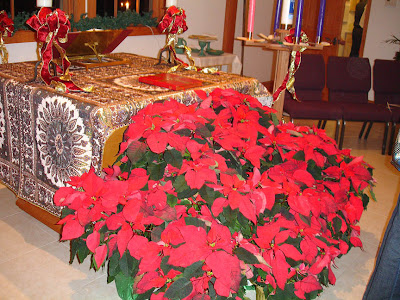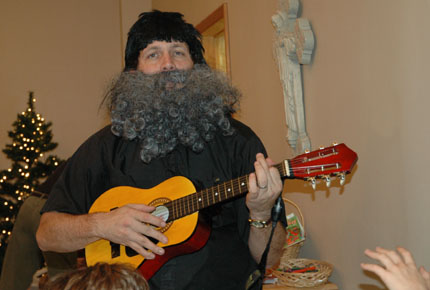"Stop being daft about Christmas."
—Trevor Phillips,
chairman of the Equality and Human Rights Commission, U.K.
The head of the commission charged with protecting human rights in Britain (pictured at right) is trying to get the message out that, "It's fine to celebrate and it's fine for Christ to be the star of the show." This, according to
an article in The Yorkshire Post is in response to a move in recent years in which school nativity plays have been banned in some places and altered in others so to not offend minorities with their Christian meaning. According to
The Daily Mail,
His intervention clears the way for councils and other public bodies, which have often allowed the celebration to be downgraded by politically correct considerations, to put up decorations, display cribs and send out cards with a clear Christmas message.
They are discussing the chairman of the commission's comments over at the On Faith Forum of
The Washington Post and
Newsweek with panelists chiming in. Anglican Bishop N.T. Wright says their,
It would be nice to think that the worm was starting to turn. The reality is that it isn't the Muslims or the Hindus who are 'offended' at Christians doing Christian celebrations. It is the old-fashioned secularists who, discovering that their myth (that Christianity would die out by the end of the 20th Century) had failed to come true.
Baptist minister and professor of law, J. Brent Walker says,
It’s ironic that the season during which many celebrate the coming of the Prince of Peace often comes with a manufactured “War on Christmas.” This yearly battle in the culture war is fought against an enemy that simply does not exist.
Of course it’s fine to celebrate Christmas, and Christ is indispensable to its proper celebration. Christ should not be crowded out of Christmas either by fussy sensitivities or grubby consumerism. Christmas is Christmas, and a tree is a tree, and a Christmas tree is a Christmas tree.
That said, I offer two important principles.
First, there is a big difference between public celebrations and governmental observances. Private citizens and religious organizations are perfectly free to celebrate Christmas openly, visibly and in most public places! It’s only governments that, under the First Amendment, cannot observe religious holidays or lead religious exercises....
Second, there is a fine line between political correctness and good manners. For example, it is perfectly appropriate to extend a specific holiday greeting like my Jewish friends do when they wish me a “Merry Christmas,” and I return a “Happy Hanukkah.” But it’s often similarly appropriate to wish another “Happy Holidays” or “Season’s Greetings” if I’m talking to a person whose religious affiliation I do not know. It’s simply good manners and common courtesy to employ a more general greeting. The same goes for merchants who have advertised goods to all Americans of many religious traditions who may or may not celebrate Christmas. None of this disparages Christmas one iota or diminishes its enjoyment in the least....
All of the panelists responses are found here:
PC Christmas.
King of Peace's pastoral resident, Jay Weldon, referred to this in passing in his recent sermon
The Journey of Advent in which he said in part,
It was also during this time that what some have called the “War on Christmas” began. Stores across America, waking up themselves to the realities of a new millennium, began asking employees to wish patrons a simple Happy Holidays. As nativity scenes disappeared from storefronts, as Targets and Starbucks and Best Buys toned down any hint of the gracious incarnation, as those familiar words of the season disappeared from most seasonal transactions, some were incensed. I have to admit that I was among those at first who missed the simple warmth of a “Merry Christmas.” I once became quite angry with a work colleague of mine who refused to wish me anything but a happy holiday. “You are a Methodist!” I told her. “We talked about your daughter’s confirmation retreat. I think it is alright for you to wish me a Merry Christmas!” She was unrelenting, and I remained quietly offended.
 It was a sign of the times, but slowly I began to learn something from those church banners juxtaposed against the malls of Atlanta. Starbucks gave me the coffee I wanted, Target gave me the candle holder I needed for my mom, Best Buy gave me the gift certificate I needed for my dad, but they couldn’t give me Christmas. It had nothing to do with their holiday salutation; Christmas wasn’t found there, and a simple phrase wouldn’t change that fact.
It was a sign of the times, but slowly I began to learn something from those church banners juxtaposed against the malls of Atlanta. Starbucks gave me the coffee I wanted, Target gave me the candle holder I needed for my mom, Best Buy gave me the gift certificate I needed for my dad, but they couldn’t give me Christmas. It had nothing to do with their holiday salutation; Christmas wasn’t found there, and a simple phrase wouldn’t change that fact.
I had to come to notice that the writing was on the wall, just as literally as Isaiah is crying out to the world in etched stone, just as these churches were calling out to me in their roadside signs. “When you drive on,” they seemed to say, “you will be reminded that what you are looking for this Christmas will not be found in those stores. When you have finished, come back and let us journey together that long road to Bethlehem. Let us beat the swords of our hearts into plowshares together, again.” If we know who we are this advent, and we know we are not yet there, we must remember again where it is we are actually going.
The full text of Jay's sermon is online here:
The Journey of Advent.
What do y'all think about the so-called war on Christmas? What do you think should be done about the disappearance of Christ from Christmas or the Holy Days from the Holidays?
peace,
Frank+
The Rev. Frank Logue, Pastor
Labels: Christ and Culture, Christmas
 When Julius Caesar introduced the calendar dated from the start of his reign in 45 b.c., January 1 was the first day of the year. But the church council of Tours in 567 a.d. moved the date giving preference to March 25, a day nine months before Christmas and so the presumed date of Jesus' conception by the Holy Spirit. For just over 1,000 years, March 25—known in church terms as the Annunciation, for the day the Angel Gabriel visited Mary—was New Year's Day. Some countries, including England, held out until the mid-18th century to change New Year's back to Julius Caeser's date of January 1.
When Julius Caesar introduced the calendar dated from the start of his reign in 45 b.c., January 1 was the first day of the year. But the church council of Tours in 567 a.d. moved the date giving preference to March 25, a day nine months before Christmas and so the presumed date of Jesus' conception by the Holy Spirit. For just over 1,000 years, March 25—known in church terms as the Annunciation, for the day the Angel Gabriel visited Mary—was New Year's Day. Some countries, including England, held out until the mid-18th century to change New Year's back to Julius Caeser's date of January 1. 


 God sent a man named John to tell people about the possibilities of this way of being alive in opposition to death so everybody would trust the source of life. John wasn't the source of life; he taught how to recognize the pattern. The true pattern, the source and meaning of everybody's life, was coming to people.
God sent a man named John to tell people about the possibilities of this way of being alive in opposition to death so everybody would trust the source of life. John wasn't the source of life; he taught how to recognize the pattern. The true pattern, the source and meaning of everybody's life, was coming to people.



































 The mall meets people where they are, whereas we blister people for not being what we want them to be. Who needs such abuse?
The mall meets people where they are, whereas we blister people for not being what we want them to be. Who needs such abuse?
 I don't have any objection to the idea that atheists can be good and morally upright people. But we need a worldview that is capable of justifying the confidence that we place in our minds, in truth, in goodness, in beauty. I argue that an atheistic worldview is not capable of justifying that confidence. Some sort of theological framework can justify our trust in meaning, in goodness, in reason....
I don't have any objection to the idea that atheists can be good and morally upright people. But we need a worldview that is capable of justifying the confidence that we place in our minds, in truth, in goodness, in beauty. I argue that an atheistic worldview is not capable of justifying that confidence. Some sort of theological framework can justify our trust in meaning, in goodness, in reason....





















0 Comments:
Post a Comment
<< Home